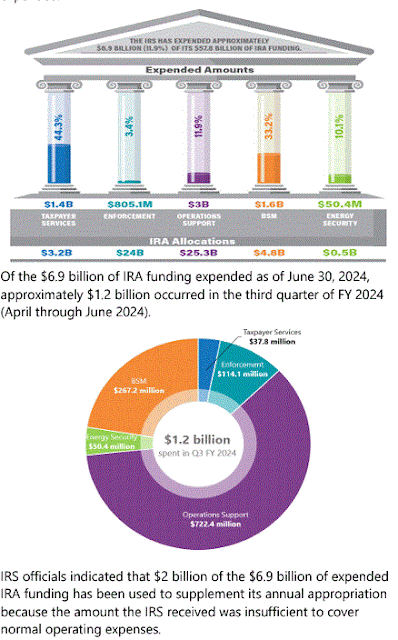As Of June 30, 2024, The IRS Expended Approximately $6.9 Billion (11.9 Percent)
of its $57.8 Billion IRA Funding.
In addition to the expended amounts shown on the graphic, the IRS expended approximately $11.6 million in Fiscal Year (FY) 2023 for the direct e-file tax return system, which is included in the total amount expended.
The IRA supplemental funding is available to the IRS through September 30, 2031, and is intended to help the IRS transform tax administration and improve the services provided to taxpayers. Like the funding the IRS receives as part of its annual appropriation, the IRA supplemental funding includes caps for the four primary budget activities, as follows:
- Enforcement -- $24 billion.
- The IRA originally provided $45.6 billion for the Enforcement funding activity. The subsequent Acts reduced the amount to $24 billion.
- Operations Support -- $25.3 billion.
- BSM -- $4.8 billion.
- Taxpayer Services -- $3.2 billion.
The IRS has used supplemental IRA funding to fund operations as its annual appropriations were not enough to cover its general operating expenses.
The IRS received the same annual appropriation amount for FY 2024 that it received in FY 2023 with no adjustments for inflation.9 For FY 2024, the IRS estimates that $1.6 billion of IRA funding will be needed to cover its annual appropriation shortfalls for pay raises, inflationary increases already built into contracts, and other current services. IRS officials noted that the continued use of IRA funds to cover shortfalls in the annual appropriation will impact its ability to successfully deliver transformation objectives.
Have an IRS Tax Problem?
Contact the Tax Lawyers at
Marini & Associates, P.A.
for a FREE Tax HELP Contact us at:
www.TaxAid.com or www.OVDPLaw.com
or Toll Free at 888 8TAXAID (888-882-9243)
www.TaxAid.com or www.OVDPLaw.com
or Toll Free at 888 8TAXAID (888-882-9243)






No comments:
Post a Comment